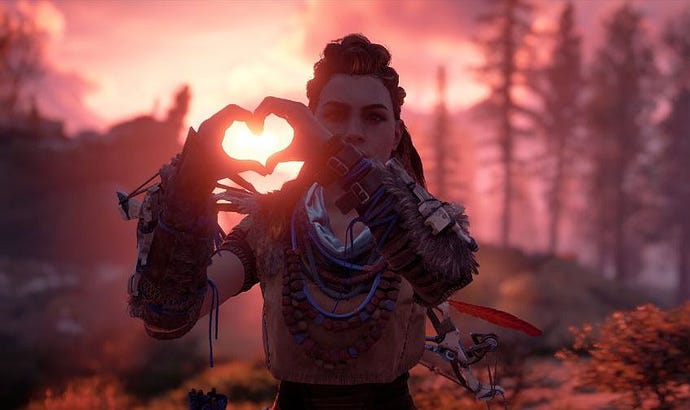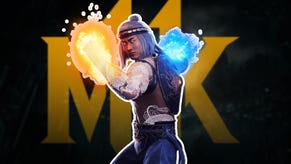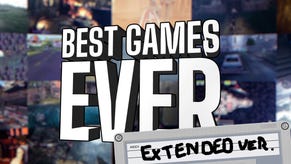"My throat was bleeding" - the dangers of vocal strain in video game VO
Cissy Jones is leaving the studio after recording monster sounds for a video game and she’s supposed to be on her way to record a commercial. Unfortunately, she can’t make it, on account of the fact her throat is bleeding. Literally bleeding. She’s never done another creature role in a video game since.
“It was awful,” the Firewatch actor tells me. “It was really, really bad. My throat was bleeding. But I have learned, when I get a script that is all exclamation points or all efforts, I don’t audition them. I just don’t need them. [Performing creature sounds is] very weird. I’ve done it once, and I was like, ‘Okay, this hurts, and I am not interested.’
"Most games do have a pretty hefty effort section: a short punch, give me three of those; a big hit, swinging your sword; getting punched in the face; getting punched in the gut; getting roundhouse kicked in the chest; falling off of a five-foot ledge; falling off of a thirty-foot cliff, you know. And you have to give three of each of these, and so it’s quite testing.”
Vocal strain is just one vocational hazard of working in VO. Any kind of recording that is heightened - whether it be wailing like a banshee, screaming orders across a battlefield, or making all the effort sounds that video game characters make when they’re hit or exert themselves - can cause damage. Sometimes permanent damage.
That’s why SAG-AFTRA, the actors’ union, stipulates that this kind of work should only last up to two hours at a time, as per union contracts. “Voiceover performers, especially in video games, are often doing vocally stressful work that can keep them on vocal rest and out of work if the session is not managed correctly,” a SAG-AFTRA spokesperson explains.
“An hour of talking really loudly is fine, but when it starts going on hour two, hour three, hour four, it’ll wreck you,” Jones adds.
Usually, these kinds of strenuous sessions are scheduled on a Friday so the performer has the weekend to rest. At the time of our interview, Jones tells me one of her acting friends has just come out of a mandatory, doctor-prescribed silence lasting eight weeks, in an effort to prevent permanent damage from an arduous session.
“The doctor literally said, ‘Oh my God, you voice actors have got to stop doing video games’,” Jones exclaims. “He’s lucky, because he got his voice back. I do know other people that lost it for good. I know people who’ve had to have surgery on their throats, and that takes you out. Listen, we’re independent contractors, right? Any day we don’t work is a day we don’t get paid. As my friend Courtenay Taylor likes to say, ‘Every time I leave the booth, I’m unemployed’.”
ITV drama Broadchurch actor Joe Sims likely isn’t the first person you would associate with this kind of work, but you’ll have heard one of his video game performances if you ever faced off against Laurence in Bloodborne. That shrill scream isn’t some digital distortion - it’s a guy from Bristol, as one of the RKG boys (like and subscribe) points out in the tweet below.
“An actor’s life is almost certifiable. I pity our neighbours,” Sims tells me over email. “Playing with different sounds, voices, cadence, etc, is fun and a hugely enjoyable part of the job. I make mad noises and experiment daily, and I reckon I’m proper lucky to do that cos the rest of my life is lovely but boring and pretty vanilla. You aren’t limited by what you look like, like in film and TV, so it’s absolutely liberating that you get to play characters the like of which you’ve come up against in epic battles. I couldn’t knock the skin off of a rice pudding in real life! It’s pure escapism and I feel incredibly lucky.”
Still, this work can take its toll. During one theatre tour, Sims had to be put on steroids to finish the job because he’d gone too far into the inhuman spectrum when playing Frankenstein’s monster every day for three months.
“I came off stage and had nothing,” Sims says. “It was incredible the clarity that the steroids brought roaring back within a day of starting, but I could never advocate that long term. I try and steam my throat before and after a voice session now and I swear by this stuff called Nin Jiom Pei Pa Koa which moistens and lubricates the throat. I buy it by the case.”
When doing VO work, Sims says he “always leaves the booth husky and shaking”, but he pushes for the big stuff like those hellish Laurence screams to be left to the end of a session. If actors push it too far, it can permanently change their voice - the one instrument they need to make a living.
“They can rupture a chord,” Jones explains. “It can permanently alter the sound of your voice. I knew a guy, back when I was taking classes, who was trying to impress an agent. He was doing this general in a big Call of Duty-type thing, and he had this normally very deep voice. After his six-month mandatory silence, where he literally had to carry around a notebook and pen, he ended up kind of speaking in this really weird raspy sound, and that’s all he had left. And he had to give up voiceover, from a class.”
An entire career can be derailed before it even begins. But even established actors can be affected by this, just like how Jones lost that commercial gig - which likely paid far more than a video game - it can lead to problems with upcoming jobs. Even jobs where the actor is called back to reprise a role.
“Vocal strain affects a great deal of my work, and I am constantly aware of it,” Far Cry 5 actor Julie Nathanson explains. “I've been a voice actor for over two decades, which means I have a pretty good personal system of warming up, staying hydrated, avoiding certain foods and activities, taking breaks, and minding intensity and vocal placement when I first find the character's voice. And even when I protect my vocal cords as much as possible for a particularly vocally stressful recording session, I can sometimes hear the rasp and feel some weakness in my voice afterwards, and I'll need to rest it.
“This also means my agents (CESD) and I consider carefully whether or not I can accept work for another project the afternoon following a morning session with excessive vocal strain. For example, if I am hired to continue working on a role I've voiced before, I need to sound exactly as I did the last time. If I'm hoarse from a previous job that day, that could change my voiceprint for that role reprisal, and that would be a problem. The same applies for voice matching.”
It’s not just their career that can be impacted by this trauma either. Actors are people who have their own personal lives, and anyone with children will know you need to bring out the big voice when they inevitably do something dangerous. Karaoke, parties, speaking at a function - it can cascade and affect all the things we take for granted. “There are weeks that I come home, and I’ve had a twelve-session week, I come home and I just don’t want to talk to anybody,” Jones admits. “I don’t want to get on the phone, I don’t want to talk to my husband, I don’t want to talk to my kids. And that’s not a good place to be.”
“Your vocal cords are muscles, and like any other muscle, they can get injured from strenuous activity,” Horizon Zero Dawn actor Ashly Burch adds. “Part of being a video game voice actor is having to engage in vocally strenuous behaviors frequently - sometimes on a weekly, or even daily basis. An otolaryngologist once referred to what we do as ‘vocal stunt work,’ which sounds metal, but ultimately means that the work is high risk and potentially dangerous.
“I know many VO actors - myself included - that were asked to scream one too many times, or had too many effort sessions in a week, and ended up with hemorrhaged vocal cords. Having Injured cords makes it difficult to work, but it's also terrifying. Is the damage permanent? Am I going to get better? What if I can't do this anymore? Luckily, it's possible to recover from most vocal damage, but it's really frightening when it happens to you.”
Since the vocal cords are muscles, they need to be properly warmed up with exercises, and actors need to be mindful of what they consume. In the past, much of the onus was on the performer to know their limits, to ask for breaks or to stipulate which part of the read they want to save until last. But thanks to the work of SAG-AFTRA and the many others raising awareness, things are improving.
“It’s getting a lot better,” performance director Tom Keegan explains. “There are many voice actors though who’ve had very little training. They happen to be very talented and very gifted at doing voices or doing funny voices, or doing cartoon voices, but their knowledge of breath, vocal anatomy, pacing themselves, is not as developed. Similarly on the development side, there are many, many very talented and gifted people who are sound engineers, that’s their background, who’ve never studied voice either. And so they know what they want from the development side, but they’re not trained in how to take care of the actor, how to take care of the actor’s voice, or even how to help the actor make this sound.
“I’m seeing a lot more audio directors are directing more. And that’s great because they know what they want, but they really haven’t studied the craft. And that’s where you get into bad behaviour from directors, because they don’t know how technically to get the performance from the actor. They may be a brilliant conceptualist, they may have a brilliant vision, but it can cross over into abuse. There actually is a directing technique, there is a craft to it.”
It’s becoming much more common for directors in video games to have this knowledge, however. More directors are asking if their performer needs to take a break in the middle of an intense session, and they’re also limiting takes when an actor is performing sounds such as death throes.
“One can only vocalise dying by fire so many times before the voice begins to sound like a handful of dry leaves screeching down a sidewalk,” Nathanson says. “I have appreciated being told - at the top of a session - that I should feel free to let them know if I feel like my voice is ‘breaking,’ and give me a sense of how much stressful work there will be in a session. I will also add that including the potential amount (or kind) of vocal strain in audition sides is extremely helpful. If not percentages, then a ballpark. If not a ballpark, then maybe just, like, one baseball card.
“It can be scary, even for me - 20 years into this career - to admit that I need a break. It feels like I'm letting someone down. Scary to think, ‘Oh no - what if they get mad when I say that I need to rest before we do ten more takes of electrocution screams? I'll just power through.’ But it's okay. It's our bodies. It's our livelihood. And we need to empower ourselves to practice self-care by staying educated about vocal health, warming up before working, and kindly, collaboratively speaking up when/if the strain becomes too much in a session.”
For more like this, check out our other articles in our week for actors.















